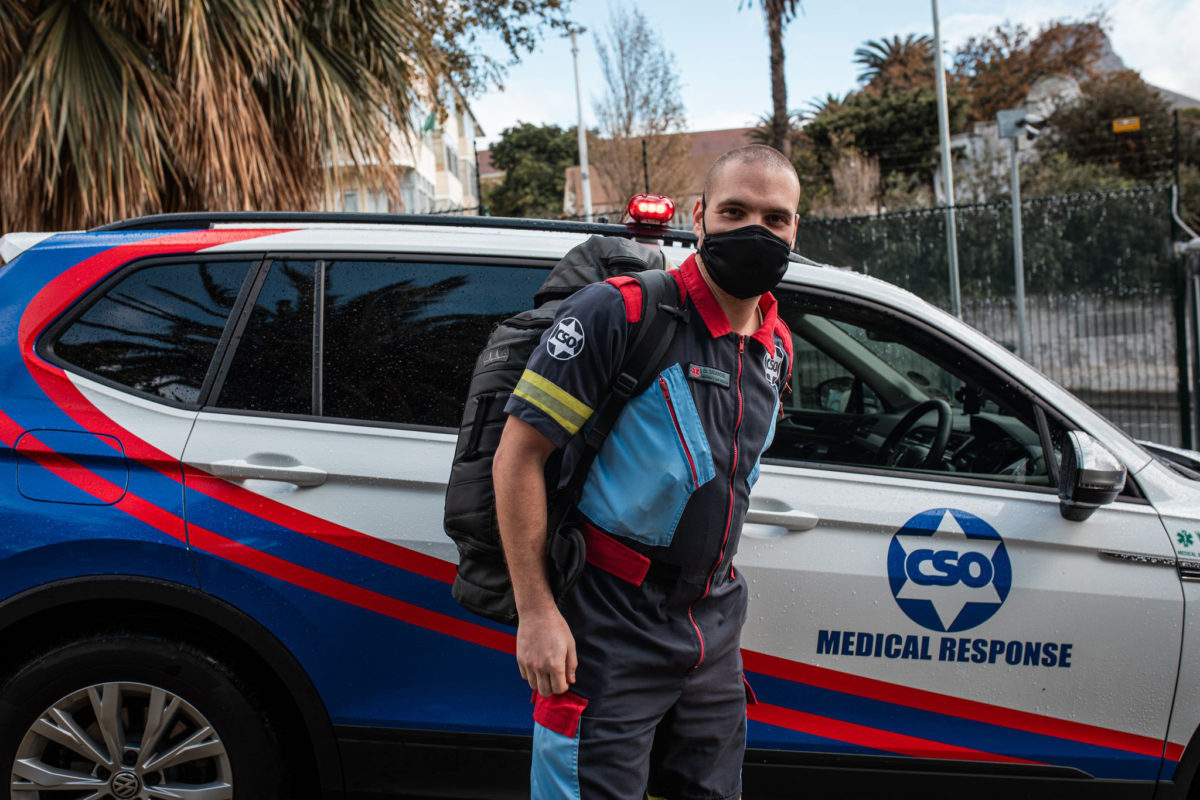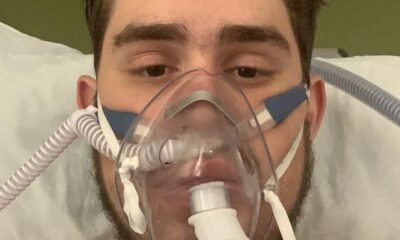
Featured Item

Dispatches from the frontlines of the COVID-19 war
The war against the second wave of COVID-19 raged in the Western Cape in December, and many of those hard hit were either local community members or on holiday. Many of the frontline warriors in the battle wearing PPE (personal protective equipment) were volunteers from the Community Security Organisation (CSO) in Cape Town.
“The vast majority of these people are doing this not only for free, but on their own dime. Our paramedics are quite literally putting their lives on the line to be there for the community,” says CSO Director Loren Raize. “This is the most heroic thing I’ve witnessed in my life, and being the mother of two kids, I can’t imagine that it’s easy for them. I have admiration and respect for this selfless mitzvah.”
After a long and tough year, even the paid staff at CSO “had no down time this December. No holiday time at all. Anyone that took leave ultimately worked through it, and some of the staff worked long hours even while infected with COVID-19,” Raize says.
Capetonian Jackie Levitt will be forever grateful to the CSO. “They saved my husband, Marc’s, life. Thanks to them, we realised he was in danger. Without the oximeter they gave us, he would have died,” she says.
“His oxygen was 58, and his heart rate was 140. Our general practitioner said he needed urgent hospitalisation, so I carried him to my car on my back as he couldn’t walk and his body was shutting down. I drove like a wild woman to Cape Town Mediclinic, and he was admitted when a nurse read his saturation levels. The hospital was full, but she discharged another patient to admit Marc.” He spent 11 days in the intensive-care unit on high-flow oxygen.
Labour lawyer Michael Bagraim says, “COVID-19 arrived like a ghost. I couldn’t walk or go up the stairs. I was sleeping almost 20 hours a day. We were stuck at home the whole of December. It was a month of horror.” In those long weeks of isolation, it was the CSO which created a lifeline of human contact, care, and support for him and his wife, Patsy, who also tested positive but didn’t suffer as much as him.
“They were there if we needed to go to hospital. They even offered to get us food or medicine – anything we needed. From a psychological point of view, it made us feel secure.” The Bagraims have since recovered. Recently, they passed a home with a CSO car outside, its lights flashing. “Patsy said to me, ‘There are our angels’.”
Looking back on the numbers in December 2020, the CSO monitored 332 COVID-19-positive patients, including delivering 64 wellness packs to patients who were visiting Cape Town and the Western Cape. CSO even went on a special trip to the Garden Route to deliver wellness packs to Jewish holidaymakers from all over the country. The organisation responded to 180 incidents – part of 368 calls to its 24/7 emergency line. This was all done by only 31 volunteers, who also made 3 619 phone calls to patients on the CSO Cape Town Wellness Programme.
Some of these volunteers agreed to speak to the SA Jewish Report about their experiences on condition of anonymity. A senior paramedic with the CSO Medical Response Unit says there is a wide array of patients in terms of demographics.
“One of the most challenging aspects has been the fear that patients and families have, especially of going to hospital and not coming home again. So many patients have refused to go to hospital out of sheer concern about what will happen to them once they get there.
“Added to this is the challenge of treating patients in full PPE. The patient is no longer able to see our faces or our uniforms, and often can’t hear us properly through our masks. This makes compassion and care that much more important to try and allay some of their fears.
“One of the added challenges is the lack of available hospital beds, and discussions with patients and family members about them not being able to go to the hospital of their choice. Another negative aspect is the denial of so many people about their potential exposure to COVID-19, and how many are adamant that they can’t possibly have the virus.”
Even with all these difficulties, there have been uplifting moments. “The Wellness Programme is absolutely phenomenal in terms of community support and patient management. To be able to monitor our patients through this channel has been so gratifying.”
He says he keeps safe through the use of PPE. “It’s important that the patient understands why we need to take an extra few minutes to don our protective gear before entering a household. The limited number of healthcare workers means we need to protect ourselves at all costs, and the extra few minutes ensures our availability for someone else because all precautions were taken for each call.”
A wellness volunteer says, “At the beginning of December, a friend asked if I’d like to monitor COVID-19 positive patients by calling them every day. As a retired nursing sister, I was interested, so applied to join, went on an online training course, and received the details of my first patients.”
Armed with a pad of paper, a pencil, and questions, she made her first phone call. “By the end of the conversation, I knew that I was going to enjoy being back in my role as a caregiver. You engage in conversation and hear more than just the answers to the questions – a lot can be learned as you listen to the way the patient responds. You form a relationship.”
She was in touch with patients ranging from 15 to 92 years of age. “Some were part of a family isolating on their own away from others, some family members all tested positive and went through the ordeal together, still others were in Cape Town on holiday and needed assistance with the delivery of groceries and medication.
“Each call and patient has their own story to tell and their own fears. Some show bravado, accept their illness, and get on with recovering. Others are anxious, and need an ear to reassure and give advice. Still others require careful management as they don’t recover as quickly, and may require medical attention and sometimes hospitalisation.
“Patients on their own find being ill with COVID-19 particularly difficult. Those with mild symptoms are frustrated by the boredom and loneliness, while patients who have more severe symptoms are more anxious and require more frequent calls. I feel privileged to be a part of this amazing programme, to exercise my nursing skills, and to be able to form relationships with people at a time when they are overwhelmed.”
A paramedic with CSO Medical says that during the first wave, he mainly helped the elderly, but “this time round, we have treated young and old”. The work has had a big impact on all the volunteers and their families. “Our families worry about us, and with the growing numbers, you cannot leave your colleagues to pick up the pieces as the volume is just too high.”
Protecting his family from the virus is “an ongoing issue – life was easier when the biggest threat was a criminal element that you could see and touch. We take every precaution.” He cannot wait to get the vaccine for himself and his family.
Raize emphasises that “the CSO emergency line is exactly that – an emergency line for life-threatening situations”, and says the community must register online for the Wellness Programme or via the WhatsApp/SMS number.
“In December, our systems came close to collapsing, and we had to put in major interventions to prevent this mainly because the community was calling the line to get onto the programme. It will be of great help if they follow the correct process.”










